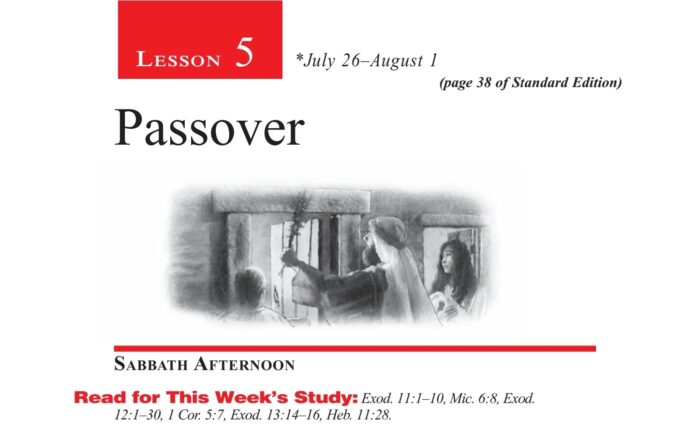Lesson Five: PASSOVER
Introduction: The Israelites see their deliverance from slavery in Egypt at hand when they witness the mighty wonders and miracles in their households whereas the Egyptians suffer the consequences of their disobedience to the commands of God. Just before their exit, the tenth and final plague strikes Egypt, but the Israelites who heed to the instructions of the Passover are saved. This week, we’re diving deeper into the significance of the Passover to us, the Israelites of today.
Memory Text: Exodus 12:26-27(NKJV)
“And it shall be, when your children say to you, ‘What do you mean by this service?’ that you shall say, ‘It is the Passover sacrifice of the Lord, who passed over the houses of the children of Israel in Egypt when He struck the Egyptians and delivered our households.’ ” So the people bowed their heads and worshiped.”
SABBATH; The final plague loomed—a moment of life or death, not just for Pharaoh, but for families, for a nation. God’s last warning had come, and the weight of decision pressed hard. One man’s stubbornness would bring devastation upon multitudes. How often do we stand at similar crossroads, knowing what is right but resisting it? The consequences of our choices often ripple far beyond ourselves. Yet God offers wisdom, strength, and grace to choose rightly. In the Exodus, we see the high cost of pride—and the mercy of a God still calling hearts to surrender before it’s too late.
(READ 1Corinthians 1:30; Philippians 2:13)
SUNDAY; The Lord brought the plague of 3-days’ darkeness upon Egypt as a last warning against disobedience to God. Pharoah refused to obey God. God then warned him about the death of the first borns beasts and male children of Egypt. Due to Pharaoh’s pride and his determined spirit of disobedience, the innocent families fell victim to this massive death of first born male children and animals. However, God is against pride and oppression of the innocent and hence calls us to be examples of both love and justice to those around us.
(READ Exodus 10:23; 11:1-10; Psalms 2:12)
MONDAY; Moses and Aaron were instructed to tell the Israelites to prepare to leave Egypt by taking part in the Passover. The focus of the Passover was to worship God, first and foremost. Each family was to pick an unblemished lamb or goat, slaughter it, roast it in preparation to leave Egypt as the Lord had commanded, and have its blood applied on their door posts. The remainders were to be burnt the next morning. Furthermore, this act of the Passover was to always serve as a reminder of God’s great and mighty acts for His people.
(READ Exodus 12:1-20)
TUESDAY; The Passover, was a symbol that prepared the Israelites for the ultimate sacrifice that was given by Jesus Christ at Calvary. By carrying it out as commanded by God, while still in Egypt, the Israelites showed faith in the redeeming power of the Lord. The blood of the lamb represented the blood of Jesus Christ, who is the Passover lamb, for the merits of His sacrifice are applied to all who are covered by His blood. The unleavened bread symbolises the sinless Messiah and the blood applied on the door posts using hyssop represents the purifying grace of God that one receives when they apply the blood of Jesus in their hearts through obedience by faith.
(READ Exodus 12:17-23; John 1:29; 1Corinthians 5:6-8; Hebrews 4:15; Psalms 51:7)
WEDNESDAY; The Israelites were to teach their children and their children’s children of this memorial act that they carried out, which is the Passover. They were to always celebrate their deliverance from Egypt. Their children were to always remember the great love of God and His care that He had towards them. In our present time, we commemorate the same celebration when we take part in the Passover, also known as the Lord’s Supper, as we always remember the ultimate sacrifice that Christ Jesus made at Calvary, that we may be delivered from sin.
(READ Exodus 12:24-28; Psalms 145:4; Deuteronomy 6:6-8)
THURSDAY; The book of Exodus begins with an account where Pharaoh commands the killing of the first born male children of the Israelites. The last plague focused on the death of the first born male children of Egypt. This shows us the weight of consequences of our choices and actions, for whatever a man sows, that is what he reaps. Just like Pharaoh’s decision exposed many innocent families to bitter consequences, so do our choices and actions affect those around us as well. The last plagues further showed the Egyptians that their belief in their gods(Pharaoh inclusive) could not save them from death.
(READ Exodus 12:29&30; Hebrews 11:28)
FRIDAY; The Passover was to be both commemorative and typical, not only pointing back to the deliverance from Egypt, but forward to the greater deliverance which Christ was to accomplish in freeing His people from the bondage of sin. In addition, the Passover must be believed by each people individually, and not as a group of individuals only.
(READ “The Passover” pp. 273-280 in Patriarchs and Prophets by Ellen G White)
CAPTIONS:
SUNDAY; One more plague
MONDAY; The Passover
TUESDAY; Pesach
WEDNESDAY; Passing the torch
THURSDAY; The divine judgement
FRIDAY; Further thought
DISCUSSION QUESTIONS;
- Why is it so important always to remember the good that God has done to you in the past, and to trust that He will do good for you in the future, as well?
- What does the fact that it took the blood of Jesus, God Himself, to atone for sin teach us about how bad sin really is?
- In what ways have you suffered from others’ sins? Or, in what ways have others suffered from your sins? What is our only hope?
- How can we understand the “fairness” of the Lord in striking dead the firstborn, many of whom were surely “innocent”? How can we harmonise this with the powerful reality of God’s love? Think, too, of the Flood. How do we understand this?



